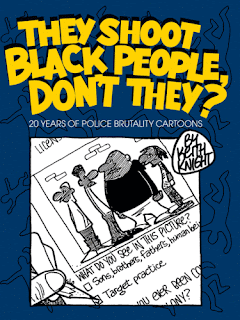Last year, amid the summer of Ferguson, Missouri's protests, cartoonist Keith Knight realized he'd been drawing cartoons about police brutalizing and killing people of color for two decades. He went through his archives, pulling out many of the old strips, and built a presentation around the work that he started touring with it in November 2014 under the title "They Shoot Black People, Don't They?" It's been fairly well-received by my understanding, so when Knight put it together in book form earlier this month, I was curious to see what he had to say.
The book collects all the strips Knight uses in his presentation, plus a few more. I've found Knight does his best work when he's really passionate about a topic, and this certainly fits the bill. Which means that the comics here are of a very high calibre. Very insightful and poignant, with some brilliantly ascerbic takes on many ripped-from-the-headlines events. Many of the strips refer to specific incidents, which are not always immediately evident; the strips were written in the context of current news, so some incidents, particularly the older ones, may not resonate now as much as they once did. Which is true of any political cartoon, but the 20 year time-frame on the book's contents make some more accessible than others.
Interestingly, and to help counter some of that, Knight also includes some notes about the strips. Presumably, it's much of the same type of thing he talks about in live presentations. He makes note of some of the specific people and events that sparked some of the cartoons, and provides some additional background and context.
He also includes a fifteen point list by Chuck Creekmur on what you can do help stop police brutality. Some of the points are only relevant in particular circumstances, but others are more general. I strongly suspect Knight relays this same material in his presentation. And as Shaun King said in a quote Knight includes in the book: "If you ever wondered what you would do if you were alive in the Civil Rights Movement, NOW IS THE TIME to find out." It's clear that Knight is not just looking for another vehicle to peddle his work, but he's (understandably) troubled and concerned about this issue and is trying to use whatever platform he has to affect change. He's using his cartoons to alert people to what's happening, and then providing resources for how to change that.
The book's intentions are noble, certainly, and the cartoons have a fierce edge to that most cartoonists don't use. The only complaint I can lodge here is that Knight's additional notes are not printed in the book itself, but included as a set of additional pages. There are a few notes printed in the book alongside some of the comics, so Knight certainly had some idea to include additional context, but I'm not sure why most were printed up separately.
But the book itself is brilliant at making you laugh with rage. If you're like me, and can't see Knight present this material in person, this is the next best thing. Available directly from the artist for either $16 (regular) or $45 (artist's edition).







0 comments:
Post a Comment